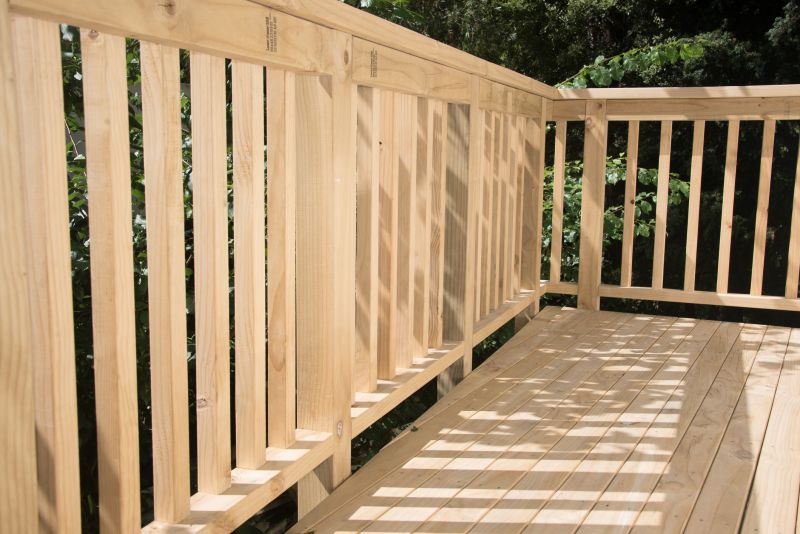Essential Products For Hardwood Deck Construction Projects
Identify key products that ensure safety, durability, and ease of assembly in hardwood deck building.
 Constructing a durable and aesthetically pleasing hardwood deck involves selecting the right products for assembly. From foundational hardware to finishing touches, each component plays a vital role in ensuring the structural integrity and longevity of the deck. Materials such as fasteners, brackets, and connectors must be chosen carefully to withstand the stresses of outdoor use while maintaining a seamless appearance. Proper selection and installation of these products can help prevent issues like warping, shifting, or deterioration over time.
Constructing a durable and aesthetically pleasing hardwood deck involves selecting the right products for assembly. From foundational hardware to finishing touches, each component plays a vital role in ensuring the structural integrity and longevity of the deck. Materials such as fasteners, brackets, and connectors must be chosen carefully to withstand the stresses of outdoor use while maintaining a seamless appearance. Proper selection and installation of these products can help prevent issues like warping, shifting, or deterioration over time.
Top Overall Option
Heavy-Duty Outdoor Fastener Set
A comprehensive set of corrosion-resistant screws and bolts designed specifically for hardwood deck assemblies. These fasteners provide strong, reliable connections and are easy to install, making them a versatile choice for various deck configurations.
Types of Products For Hardwood Deck Assemblies
Deck Screws
Specialized screws designed for fastening hardwood planks securely while minimizing splitting and damage.
Joist Hangers
Metal brackets used to support and secure joists, ensuring stability and alignment.
Post Brackets
Connectors that attach support posts to the foundation or framing structure.
Corner Braces
Reinforcement hardware used to strengthen deck corners and joint areas.
Ledger Boards
Heavy-duty mounting hardware for attaching the deck to a building or wall.
Anchor Bolts
Bolts used to secure the deck structure to concrete or masonry foundations.
Adjustable Deck Connectors
Flexible hardware that allows for alignment adjustments during assembly.
Post Caps
Protective covers that shield the top of support posts from weather and debris.
Flashing Materials
Metal or rubber strips used to prevent water intrusion at critical joints.
Surface Fasteners
Nails and screws used for attaching decking boards to framing.
Tie Plates
Reinforcing plates that connect multiple framing members for added stability.
Support Brackets
Hardware that provides additional support for beams and joists.
Leveling Shims
Thin pieces used to level and align deck components during installation.
Deck Post Anchors
Devices that secure posts to the ground or foundation with stability.
Corner Brackets
Metal brackets that reinforce deck corners and joints.
Fastening Clips
Clips that hold decking boards tightly together for a uniform surface.
Weatherproof Sealants
Sealants used to protect hardware and joints from moisture ingress.
Popular Choices
Widely used fasteners suitable for hardwood decking, offering durability in outdoor environments.
Commonly selected for supporting joists securely and ensuring even load distribution.
Popular for anchoring support posts to concrete or wood foundations.
Favored for their flexibility during installation and alignment adjustments.
Preferred for creating smooth, gap-free decking surfaces.
Chosen for protecting joints and hardware from moisture damage.
Commonly used to add finishing touches and protect posts from weather.
Popular for preventing water intrusion at critical connection points.
Frequently selected to reinforce structural elements of the deck.
Often used to enhance stability across multiple framing members.
Commonly used for precise leveling during deck assembly.
Popular for securing decks to concrete or masonry foundations.
When working with hardwoods, it's important to consider the specific characteristics of the material. Hardwood decks often require specialized fasteners and connectors that can handle the density and weight of the wood without causing damage. Additionally, moisture-resistant hardware can be beneficial in preventing rust and corrosion, especially in humid or variable climates. The right products can also simplify the assembly process, making it easier for both DIY enthusiasts and professionals to achieve precise, secure connections.
Quality hardware for hardwood deck assemblies comes in various forms, including heavy-duty screws, corrosion-resistant bolts, and adjustable brackets. These components are designed to provide flexibility during installation, accommodate different deck configurations, and ensure stability over time. Selecting products that are compatible with hardwoods and suited for outdoor exposure is essential for creating a safe and enduring deck structure. Properly chosen hardware not only enhances the deck's appearance but also contributes to its overall safety and usability.
Investing in reliable, high-quality products for your hardwood deck assembly can lead to a more satisfying building experience and a longer-lasting finished project. Whether you are constructing a new deck or repairing an existing one, understanding the different types of hardware and their applications will help you make informed decisions. With the right components, your hardwood deck can become a beautiful, functional outdoor space for years to come.
Key Buying Considerations
- Material compatibility: Ensure hardware is suitable for hardwoods to prevent damage during installation.
- Corrosion resistance: Prioritize hardware with rust-proof coatings for outdoor durability.
- Load capacity: Select products rated for the expected weight and usage of the deck.
- Ease of installation: Consider hardware that simplifies assembly, especially for DIY projects.
- Adjustability: Look for connectors that allow for fine-tuning during setup.
- Weatherproofing: Use sealants or protective coatings to extend hardware lifespan.
- Compatibility: Verify that all components fit together and are compatible with your deck design.
- Quality standards: Choose products that meet relevant safety and quality certifications.
- Environmental conditions: Consider climate factors such as humidity and temperature fluctuations.
- Budget considerations: Balance cost with durability and quality for long-term value.
- Design aesthetics: Select hardware that complements the overall look of your deck.
- Ease of maintenance: Opt for hardware that requires minimal upkeep over time.
- Availability: Ensure the selected products are readily available for timely project completion.
- Brand reputation: Consider products from reputable manufacturers known for quality.
- Warranty options: Check if hardware comes with warranties or guarantees for peace of mind.
This content contains affiliate links. We may earn a commission if you make a purchase through these links, at no additional cost to you.
